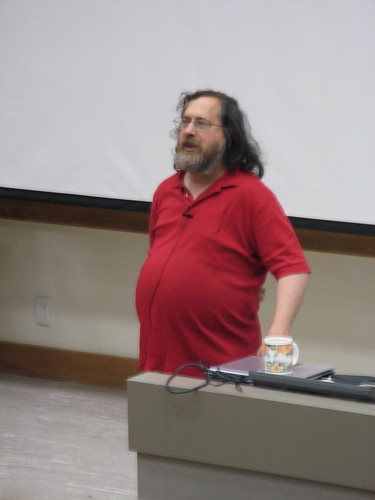Richard Stallman on Free Software In Christchurch

On Saturday I was fortunate to be able to see Richard Stallman speak right here in Christchurch, NZ. He spoke on "free software in ethics and practice"; the issues of non-free software, how it affects our society, what the FSF is doing about it, what we as individuals and computer users can do about it and free software in schools and education. He spoke extensively on the "four freedoms" that software users should be entitled to and even suggested they should be classed as human rights. He also promoted the FSF, giving away stickers, selling his book, selling stuffed (animal) gnus and encouraging folk to join the FSF.
While the talk was thoroughly enjoyable, I don't agree with some of the fundamental ideas on which the free software foundation and movement is founded. I wouldn't consider myself part of the "free-software movement" as Richard defines it, nor would I consider formally joining it. I associate much more with the "Open Source" (also as Richard defines it) camp, and am open to the existence and use of proprietary software.
I use and I am happy to use and pay for proprietary software while;
- no equivalent and useful free or open source software exists
- I have no reason not to trust the distributor, and
- the software remains reliable, useful and worth any costs.
I find Richard's points of view rather extreme. I believe that proprietary software can and does have a place in our society and economy, without negative effects on society. Of course, as in any industry, there are nasty folk, often tending to be monolithic corporations, whose behaviour, such as the moral abuse of software they create, has negative effects on society. However even if all software were free, these people would still be nasty, greedy and contribute negatively to society -- possibly in different industries or with different media.
Further, I believe that without sales-funded development of non-free software, software, whether free, open source or proprietary, would not be as advanced as it is today. That is not to say that I prefer proprietary software over open source or free software; I don't. But I do accept it.
There were a few points and quotes that I found particularly interesting, controversial or entertaining;
-
"When a friend asks you to share [proprietary] software with them, you can either say 'No' which is evil because they are your friend, or you can say 'Yes' which is evil because you are breaking the agreement with the software distributor. There are two solutions to this problem; 1. Don't have any friends, that's what proprietary software implies, or 2. don't use proprietary software."
(or something to that effect)
-
"It's as if there's someone drowning. If you can swim and there's no one else around, you should save them -- as long as that person is not Bush.
(or something to that effect)
- Richard considers most popular GNU/Linux distributions, including Fedora, Ubuntu and most derivatives to be non-free, because they contain non-free binary firmware (device drivers). Richard himself pointed out that source code does not exist for much of this firmware. Fubuntu (spelling? link?) is free, but Richard won't endorse it because it is too similar-sounding to non-free Ubuntu and "He can't practically support one, but not the other", or something to that effect.
- Richard considers SaaS to be non-free based on the principal that you do not have control over the system computing your data, even if the server-side and client-side software employed in that SaaS are all free.
As I have noticed elsewhere in my limited observations of the free software movement, I noticed a number of subtle similarities to religious movements. Personally I find this a little off-putting, almost disturbing. Richard's sketch on "The Church of Emacs", although it was entirely fictitious and entertaining, suggests to me that Richard realizes this, and perhaps even enjoys, provokes or encourages this.
The "Church of Emacs" sketch.
The talk was at the University of Canterbury where I take some Computer Science papers. It was well-attended and was part of the "GNU Zealand Tour". Richard recorded the session and said the recording would be made available under a creative commons no-derivatives license. If or when I find it I'll update this blog.
The views and opinions expressed in this article are solely those of Bevan Rudge, and are not representative of any company or other individual.
UPDATE: I found someone who seems to, at least in part, agree with me; foobar on geekzone.

